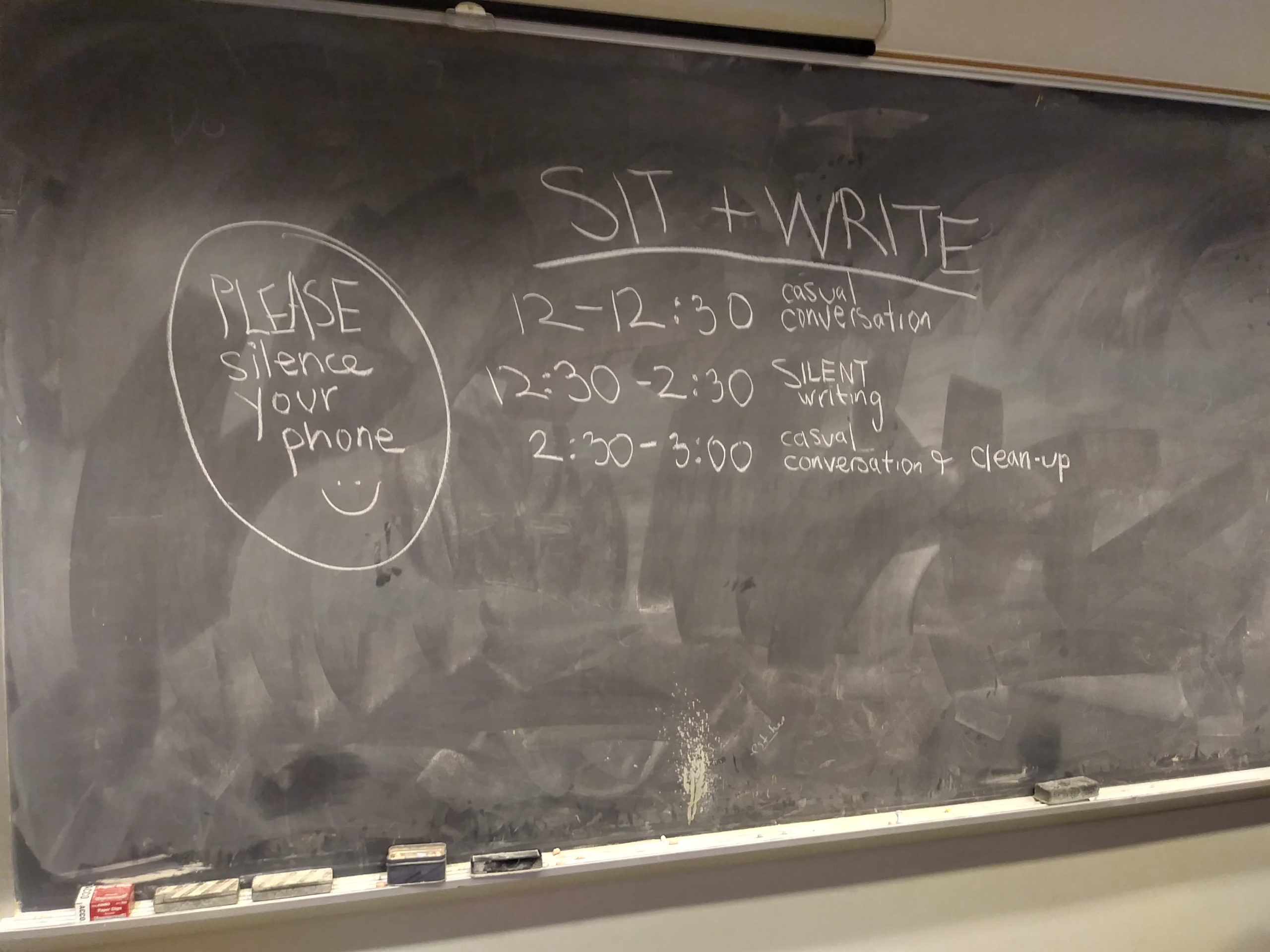The Kelly Writers House is nestled between modern concrete behemoths so tightly and seems so out of place that it feels as though the University of Pennsylvania’s campus has sprung up around the building, encroaching slowly like an emerging mountain. It’s a small but sturdy bastion more than able to defy the creep of modernity as long as its presence is needed. And every Saturday at 12:00 PM, it’s the haven it appears to be: a place of quiet and ardent writing in a world buzzing with activity and stimuli.
 The Sit and Write group is headed by local poet and Penn Today contributing editor Julian Shendelman. His chapbook, Dead Dad Club, was published by Nomadic Press. He was a 2012 Lambda Literary Fellow and has published work in Bat City Review, The Walrus, and Trans Homo Gasp! He describes himself as a “writer, editor, facilitator” and manages to be all three during Sit and Write. Nearly every Saturday, he reserves room 202 on the second floor where writers, both published and unpublished, congregate to spend three hours in methodical writing. If you don’t have a project ready to go, Julian has a small pile of prompt and writing exercise books to get you started. Some writers work on novels, some on short stories, some on nonfiction pieces. I’ve recently used the time to work on edits of my manuscript to meet some publisher deadlines. There’s shareable food, classical music, and a general understanding that we’re all there doing the same thing, and there’s camaraderie in that.
The Sit and Write group is headed by local poet and Penn Today contributing editor Julian Shendelman. His chapbook, Dead Dad Club, was published by Nomadic Press. He was a 2012 Lambda Literary Fellow and has published work in Bat City Review, The Walrus, and Trans Homo Gasp! He describes himself as a “writer, editor, facilitator” and manages to be all three during Sit and Write. Nearly every Saturday, he reserves room 202 on the second floor where writers, both published and unpublished, congregate to spend three hours in methodical writing. If you don’t have a project ready to go, Julian has a small pile of prompt and writing exercise books to get you started. Some writers work on novels, some on short stories, some on nonfiction pieces. I’ve recently used the time to work on edits of my manuscript to meet some publisher deadlines. There’s shareable food, classical music, and a general understanding that we’re all there doing the same thing, and there’s camaraderie in that.
Ask accomplished authors their advice for young writers and publishing hopefuls and you get some version of the same answer: you have to write. They are sometimes specific. Stephen King, for example, recommends a word count of no less than 2,000 a day to get proper practice in.
Others are less exacting. At a Handmaid’s Tale event I attended in Toronto, Margaret Atwood stated, simply: “Do you write? Congratulations, you’re a writer.” To be a writer, you must write—it has to be a basic part of your life. Julian’s Sit and Write initiative helps with that.
The fact of the matter is, we’re busy folks. We’ve got day jobs, maybe even night jobs. We’ve got doctor’s appointments and chores and birthday parties and training appointments at the gym. Sitting down and producing a couple thousand words of usable writing every day isn’t always a reality. I think it rarely is. What Sit and Write provides, first and foremost, is an opportunity to put stored up and restless writing energy to good use. It also relieves a fair bit of stress and guilt that may accumulate during the week as you miss writing goals.
Another benefit Sit and Write offers is a chance to continue the same level of work you were producing in your collegiate workshops while growing as a post-collegiate writer. We took for granted that we’d have a room full of writers reading our work and offering feedback. And while Sit and Write is not necessarily that, it comes pretty close. Julian runs an organized program each week. There’s scheduled room to talk about work before and after the writing session. There’s a network there of regulars who you come to feel comfortable around the same way you learned to eventually be comfortable with the faces in your workshops as you worked through a BA or BFA together.
And one of the best aspects of this? It’s completely free. Sit and Write meets (almost) every Saturday in room 202 in the Kelly Writers House located at 3805 Locust Walk. You can visit Julian’s website to see the schedule of upcoming dates. The group is open to any writer, student or otherwise, Penn-affiliated or not, to attend at any point between 12:00 PM and 3:00 PM (some attendees come and go during that period as their schedules allow; the only rule is you move about as respectfully and quietly as possible).
If you need any more reason to visit the group, Julian puts it best in his own words: “After years of feeling guilty for not having a steady writing practice, I finally figured out that I wasn’t going to change. Instead of forcing myself to become a different person, I realized that I could use peer pressure to trick myself into writing every week. My Sit and Write regulars seem to benefit from the same structure—by adding peer support to what can be an otherwise isolating process, writing becomes a low-stakes community gathering with the pleasant side effects of productivity and accountability.”

Melanie is a copywriter and author of two novels, The Rules of Me published in 2018 through Waterton Publishing and a forthcoming novel in 2021 through Lanternfish Press. Her short fiction has been published in Ghost Parachute, Meat for Tea, and A Woman is a Cinema. Her nonfiction and criticism pieces have appeared on POPSUGAR, Prometheus Dreaming, and DIYMFA. She enjoys cooking, golfing, and exploring Philly’s restaurant scene.
